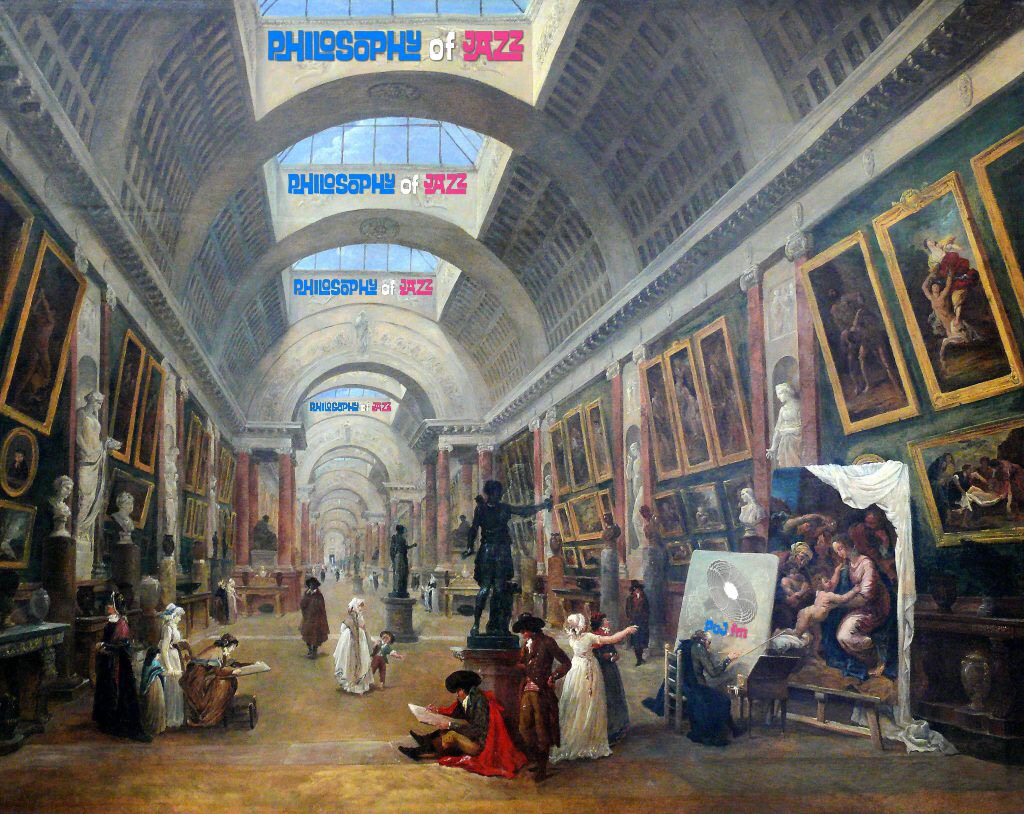Ae9. Why is jazz great?

(Painting by Hubert Robert (1733–1808) in the public domain)
The following authors replied to the question "Why is jazz great" at Quora[edit]
Underneath each author's claims in green color is a critique in blue.[edit]
- Peter Flom reports that his favorite forms of music to listen to are classical (in particular, the baroque and earlier) and jazz (particular bebop and similar styles). Something about his brain is pleased by the complex polyphonies present in each. If Bach were alive today he'd be writing jazz.
- That Bach would today be writing jazz is an empty speculation on anyone's part in answering the question either way. One can make equally good cases for the possibility that Bach would or would not be playing jazz today. The argument that he would be playing jazz is the one given by Flom—Bach might find it intriguing and challenging and something he would like to learn and master. Flom provides a reason to believe Bach would pursue an interest in jazz because both jazz and Bach's music contain "complex polyphonics." While there is truth in this claim of complex polyphonics being found in both, it remains unclear how best to interpret this concept.
- However, there is limited reasons to believe that he has to become a jazz composer were he to be whisked to the present in a time machine and live out the rest of his time in the 21st century. Bach might wish to continue pursuing classical musical forms and compositions for large orchestras, or study more modern and contemporary classical musical forms while ignoring jazz. We just don't know enough about his predilections and interests and motivations to make a reasonable surmise either way as to what Bach would actually do were he to find himself permanently in the 21st century from the early 18th century. Maybe he would be too freaked out ever to write music again, and so forth. There are too many parameters and variables making predictions about Bach's future actions in this implausible scenario. Nevertheless, Peter Flom makes a fun point in a clever way.
- A teacher from Australia, David Stewart, writes that jazz, more than any other musical form (with the possible exception of classical music), isn't about image, money or fame - it's just about music. Nobody gets into playing Jazz because they know it's a shortcut to fame and money and nobody listens to a jazz performer because they like the way they look. Pop and Rock music is littered with musicians who have no actual talent but nobody gets anywhere in Jazz unless they can actually play. It's a musical form that is solely populated by people with talent who genuinely love the music that they play which makes it music in it's purist form. (Written December 1, 2011)
- All of the above seems more or less true.
- Charles Owens, father, husband, saxophonist, composer, and educator, argues that jazz is the ultimate form of self expression. You have to "play jazz with intellect, spirituality, passion, and virtuosity," he writes. Other forms of music require some of these, but not all of them at once. (Written May 5, 2014)
- Classical musicians (as well as possibly many other genres of music) would disagree and rightly so. Good and great classical musicians certainly have virtuosity and can certainly be performing music with spirituality and passion. All music requires some level of intellect because of the need to interact and coordinate with other musicians. Plus some classical musicians can improvise classical music thereby requiring just as much intellect as improvising jazz musicians. Owens's point shows his high regard for performing jazz musicians, but his overall position is hyperbolic.
- Software developer, Bill Coleman, maintains that improvised music is the ultimate expression of spontaneous, organic creation and provides a meeting of great minds to paint magnificent sonic landscapes bigger than any one musician. It's a beautiful thing when it is done well. And nobody does it better than the great Jazz musicians. Also Jazz has infectious rhythms that can turn an audience into a single pulsing unit; just imagine what it was like to be dancing in the crowd to Chick Webb - Wow! Additionally, jazz was also "wrong," bad, nasty, dangerous and rebellious. For generations it was the music of youth, courage and optimism.
- Is jazz today still the music of "youth, courage, and optimism"? Not really. It is certainly not the music of youth because the average age at jazz festivals is extremely high.
“Demographically, jazz ticket buyers across the 19 communities are middle-aged, predominantly male, and very well educated. On average, only 17% are under age 45, and 80% are white. Perhaps that data, gathered in summer and fall 2010, reflects the nature of the audiences at the institutions where it was collected. Perhaps it also reflects the fact that the JAG surveyed only ticket buyers—the people who themselves purchased admission, whether for themselves or another—and not ticketholders at large. In contrast, the 2008 NEA Survey of Public Participation in the Arts indicates that the median age of jazz concertgoers was 46, or in other words, about 50% of jazz audiences were under age 46.”[1](bold not in original)